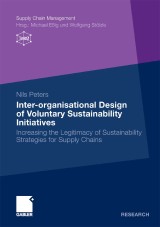Details

Inter-organisational Design of Voluntary Sustainability Initiatives
Increasing the Legitimacy of Sustainability Strategies for Supply ChainsSupply Chain Management
|
53,49 € |
|
| Verlag: | Gabler |
| Format: | |
| Veröffentl.: | 03.07.2010 |
| ISBN/EAN: | 9783834987204 |
| Sprache: | englisch |
| Anzahl Seiten: | 226 |
Dieses eBook enthält ein Wasserzeichen.
Beschreibungen
Conceptual aspects of voluntary sustainability initiatives in the context of proactive sustainability strategies for supply chains.- Theoretical aspects of designing voluntary sustainability initiatives for supply chains.- Initial framework: a resource-based view of institutional entrepreneurship in the design of voluntary sustainability initiatives for supply chains.- An exploratory study of the institutional entrepreneur's resources in the design of legitimised voluntary sustainability initiatives for supply chains.- Development of the research model: resources, the design of voluntary sustainability initiatives for supply chains, and legitimacy.- A confirmatory study of the institutional entrepreneur's resources in the design of legitimised voluntary sustainability initiatives for supply chains.- Conclusion, further research and implications for business practice.
Dr. Nils Peters received a doctor’s degree from the University of St.Gallen (HSG) in business administration at the chair of Prof. Dr. Wolfgang Stölzle. Since then he works as management consultant.
Voluntary sustainability initiatives (VSIs) have become the most applied approach for companies to set environmental or social obligations for their supply-chains. However, companies face two main challenges in the design of VSIs: Firstly, they recognise acceptance problems by different stakeholders and opposition by competing initiatives. Secondly, they experience significant resource demands to set up VSIs and ask for more efficient solutions. Nils Peters addresses these challenges by empirically analysing the key resources and complementarities that enable companies to efficiently establish effective designs of VSIs both in terms of participants’ compliance and the acceptance of initiative-external stakeholders. <br>
<br>
<br>
Voluntary sustainability initiatives (VSIs) have become the most applied approach for companies to set environmental or social obligations for their supply-chains. However, companies face two main challenges in the design of VSIs: Firstly, they recognise acceptance problems by different stakeholders and opposition by competing initiatives. Secondly, they experience significant resource demands to set up VSIs and ask for more efficient solutions. Nils Peters addresses these challenges by empirically analysing the key resources and complementarities that enable companies to efficiently establish effective designs of VSIs both in terms of participants’ compliance and the acceptance of initiative-external stakeholders. <br>
<br>
<br>


















